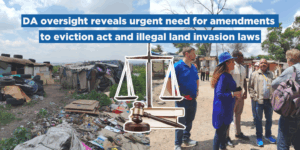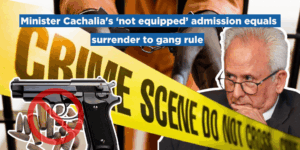We must have parliamentary oversight and make a national state of disaster subject to the same procedural constraints that already apply to a state of emergency in our law. After all, the risks of the abuse of power under a state of national disaster are similar to those historically associated with a state of emergency.
Every time the Minister of Cooperative Governance and Traditional Affairs, Nkosazana Dlamini Zuma, extends the national state of disaster without consulting Parliament, we are being habituated to a new constitutional convention.
This convention holds that the proper response to anything deemed by government as a national disaster is to shut up and comply with the ensuing ministerial diktats, finish and klaar.
The Disaster Management Act leaves Parliament with no formal and direct supervisory role over these decisions, even as it transfers extensive legislative powers to the national executive for indefinite periods of time. So much for the legislative authority of Parliament.
Opposition MPs are free to ask ministerial questions and call for reports in portfolio committees. But we have had to go to court to get crucial information such as the reasoning behind lockdown regulations and the details of the government’s Covid-19 vaccine roll-out plan.
Recently, the penny dropped for a few free-speech activists when they realised, with horror, that in this election year, all political events are currently banned. Even if the ban is lifted in the coming weeks, it can readily be reimposed by the stroke of a ministerial pen, regardless of whether there are less restrictive means to curb a third wave of the pandemic.
This command-and-control mode of government does not accord with the open and democratic society envisaged by our Constitution. And so, the DA has gone to court to challenge the constitutionality of section 27 of the act, the lynchpin of government power under a national state of disaster. Depending on the outcome of the case, we will also table amendments to the act in Parliament.
Our goal is not to tie national government’s hands behind its back. Of course, governments need temporary, extraordinary powers to deal with temporary, extraordinary circumstances such as emergencies and disasters. Our case is against the lack of substantial checks and balances on how national disaster powers are exercised – an enormous loophole for the abuse of power that will not magically close after Covid-19 has been defeated.
In terms of the act, the power to declare a national state of disaster is in the hands of one person – the Minister of Cooperative Governance and Traditional Affairs. The incumbent in that job isn’t famous for her love of accountability. But in the near future we might have an even worse minister: someone like Jessie Duarte, perhaps, serving in something like an Ace Magashule administration.
What constitutes a national disaster is so vaguely defined that the decision almost amounts to a discretion. Once such a national state of disaster is declared, the self-same minister then obtains the power to make regulations and issue directions concerning vast swathes of ordinary life – and to authorise others to do the same. And before the national state of disaster expires, the same minister has the power to extend such a national state of disaster for a period of one month at a time, ad infinitum.
The DA’s solution? Make a national state of disaster subject to the same procedural constraints that already apply to a state of emergency in our law. After all, the risks of the abuse of power under a state of national disaster are similar to those historically associated with a state of emergency.
More specifically, we want the minister to table a declaration of national disaster in Parliament as soon as possible after it has been gazetted, along with all regulations made and directions issued under such a declaration. We want the declaration to include reasons the disaster in question cannot be dealt with under existing legislation.
We want Parliament, not the minister acting on her own, to have the power to authorise the extensions of a national state of disaster. And, most importantly, we want the National Assembly to have the power to vote down any subordinate legislation made under such a declaration following a public debate.
What’s the use of a parliamentary debate and vote, especially given that the president and the minister’s party is likely to have a majority in Parliament? At the very least, the public will have prior notice of the measures the government intends to take to curb an event deemed a national disaster, and a prior explanation as to why these measures are necessary.
If such parliamentary supervision existed in our law, maybe the defects in the research and reasoning behind the cigarette ban would have been discovered before the ban was imposed, and not months down the line in the Western Cape High Court.
And maybe if Parliament had insight into deliberations of the National Command Council, government would’ve been prompted, months ago, to make the procurement of the vaccine its top priority.
But the most compelling argument for giving Parliament a supervisory role in a national state of disaster concerns the future, not the past. SA is not immune to new strands of authoritarianism.




